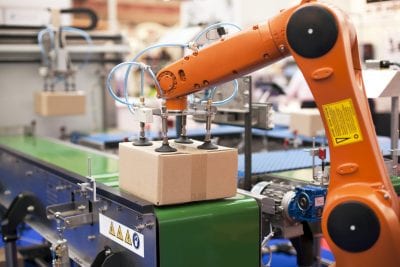Technology is diving deeper inside the logistics sector, and it isn’t limited to just IoT and blockchain. There are many technology applications now available that can significantly benefit the performance of logistics companies. Although most of the innovations are utilized to enhance tracking, data analytics, and digital operations, there are additional fields of the logistics industry where optimization is much needed. The transportation industry is beginning to move away from depending on manual operation, especially in the context of fulfillment, sorting, packing, etc. One of the newer tools created to solve these issues are pro cobots, also known as collaborative robots.
What are cobots?
Cobots are devices whose main role is to assist human employees with manual tasks. Cobots are mainly used for sorting and packing orders, handling heavy and dangerous freight, and other manual warehousing tasks. The main purpose of cobots is not to replace human jobs, but to help them with execution and live up to their name of helping to cooperate safely with people.
What are the opportunities and benefits of using pro cobots?
Many giant retailers like Amazon have already been utilizing robots for a long time. In 2012, the company acquired Kiva Systems, a provider of mobile robotic fulfillment systems. According to the IDC report, at the end of 2018, nearly 45% of 200 of the world’s largest e-commerce companies have been deploying robotic technology. This means that the cobots market is about to accelerate in the next few years and has some comprehensive benefits to offer businesses.

- Performing repetitive tasks, which increases general productivity. Some of the simplest tasks can be fully executed by cobots. Robotic assistance can help escalate processes drastically as the cobot can be taught to perform a certain task quickly without errors. According to Forbes, bots from 6 River Systems increase the pick-to-cart rate from 90 units per hour to 200 units per hour. Robots can also be particularly useful in sorting freight or parcels of different sizes and types, as the implemented pattern allows them to do so.
- Reducing costs. Naturally, you don’t need to pay robots for work except for the investment to buy robotic technology. However, the payoff won’t make you wait for a long time. WDP states that the average cost recovery period for part-automation is between 1.6 and 1.7 years. If production speeds up and the error rate decreases, it ultimately results in a higher profit.
- No place for error. One of the most comprehensive benefits of cobots is their resistance to making mistakes compared to humans. Machines are faster at performing repetitive manual tasks and are less prone to errors.
- Handling heavy loads. There are different types of cobots, and some of them can assist in picking up or handling heavy or dangerous freight, therefore helping prevent human injuries.
Ultimately, robotic devices are becoming a part of the logistics industry. Companies like have successfully deployed cobots and have boosted their productivity at their logistics facility. The growing awareness of collaborative systems means they certainly have a bright future and real, rewarding benefits.
